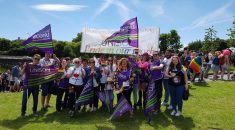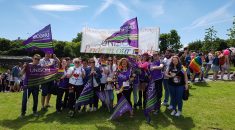During February most of us are thinking about AGM’s, be that with our Branches, Service Group or SOG’s. The Regions LGBT SOG is no different however February is also a particularly busy time for them as it is LGBT History Month.
This celebration in the LGBT Community originates from the USA, having been started there in the mid nineties to remember and celebrate the Stonewall Riots that took place in the summer of 1969 at the Stonewall Inn, Greenwich Village, New York.The Stonewall Inn was a well known gay venue and was raided by the police in the early hours of the morning. The local gay community took exception to this and fought back against police thus starting the launch of the gay civil rights movement throughout America.
As a general rule of thumb a lot of things that happen in America tend to land on our shores about 10 years later and LGBT History Month was no exception. This idea was picked up by the LGBT community and used to celebrate the abolition of Section 28.
Section 28 was brought in by the Conservative Government at a time when lesbian and gay rights campaigners were gathering momentum. Generally the 80’s were a time of social and civil unrest. The government had been in conflict with the National Union of Miners in arguably the most memorable period of industrial action in modern times, they introduced the hugely unpopular ‘Poll Tax’ , unemployment had reached an all time high of over 3 million, interest rates for home owners hit 15% forcing many people to sell and end up in debt while an elite group in the south of the country were accumulating extreme wealth while the rest of the country was struggling to survive.
Amidst all this the worlds population became aware of AIDS, or as the media branded it at the time ‘The Gay Plague’. The scaremongering from the tabloid press and other areas of the media generated widespread condemnation of the gay community and the prejudice they faced was immense.
Despite this Lesbian and Gay People were receiving acceptance from the political left and Trade Unions. The group Lesbians and Gays Support the Miners had worked extremely hard to support striking mining communities in South Wales and as such they earned the respect and admiration of miners throughout the country for their tenacity, resilience and determination to fight for a just cause. This lead to support to them from the National Union of Mineworkers and with their support they received political acknowledgment from the Labour Party and subsequently the political campaigns for equality for lesbian and gay people gathered momentum.
The perceived unacceptable lifestyles of lesbians and gays coupled with their support from the Trade Union movement and the Labour Party was something that the Conservative Government could not accept and as such introduced Section 28 of the Local Govt Act. This act prohibited schools from teaching about homosexuality as an acceptable form of lifestyle and same sex relationships being an acceptable family unit.
The campaign for the repeal of Section 28 was largely orchestrated by an organisation called Schools Out. This was formed by an association of Lesbian and Gay Teachers who campaigned and lobbied tirelessly for the next decade and a half until eventually the Act was abolished, initially in Scotland in 2000 with England and Wales following in 2003.
The abolition of the act and the subsequent equality laws we now have in place in the UK do not mean that the struggle for LGBT Equality is at an end.
Same sex marriage is still a significant issue for the mainstream religions, there is still a disproportionate amount of social stigma attached to identifying as LGBT. Hate crime against LGBT people has significantly increased as a result of the Brexit issue coupled with the increasing prominence of the far right political parties in the UK and mainland Europe along with the political changes in the USA.
Being LGBT is not a lifestyle choice, it’s simply a label put on you to describe part of what you are, but that label and the ability to simply be yourself carries with it many personal risks. Because of this, we as trade union activists will continue to campaign, raise awareness and educate people about LGBT issues. We will never stop celebrating our history and those who fought to make our lives so much easier today and we will never stop campaigning to make life better for those that will follow.
You can find out more about UNISON’s involvement in LGBT history by visiting the LGBT Highlights in History page
If you identify as LGBT and would like to be involved in the LGBT Self Organised Group then please email Paul Riley, LGBT Regional Lead at p.riley@unison.co.uk.
Jennifer Black
Regional LGBT Co-Chair


